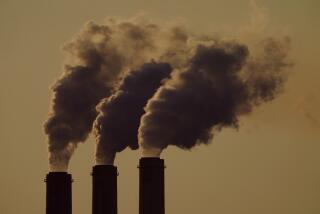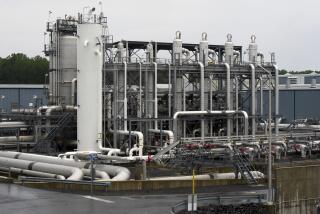EPA OKs air pollution permits for Shell’s Arctic Ocean drilling
WASHINGTON -- The Obama administration on Friday said that it would grant Royal Dutch Shell a one-year air pollution permit for an Arctic drilling rig, further bolstering the possibility that over the next two months Shell will start its controversial project to drill for oil off the Alaska coast.
The Environmental Protection Agency granted the permit in response to a Shell request for a waiver from current air pollution regulations for the Noble Discoverer, an offshore drilling ship. In a statement, the EPA said the so-called compliance order issued to Shell “sets interim air pollution emissions limits for the company’s activities, and ensures that Shell’s operations will meet congressionally mandated air quality standards under the Clean Air Act.”
The compliance order “addresses generator emissions” from the Discoverer’s generators, which slightly exceed the limits for nitrous oxide and ammonia, said Shell spokeswoman Kelly op de Weegh. “We have lowered these emissions using the current, best available technology.”
The EPA’s decision comes one day after the Interior Department cleared the way for Shell to do preparatory drilling in the Chukchi Sea. The drilling is necessary to install a blowout preventer at one well site, but the government and Shell say that it will not involve penetrating pockets of oil and gas.
Environmentalists decried the pollution permit as further evidence of what they see as the administration’s acquiescence to Shell and the oil industry, despite assurances from the administration that it would “hold Shell’s feet to the fire” over drilling in the Arctic.
“Today’s planned announcement that the Environmental Protection Agency has given Shell Oil an exemption to pollute in America’s Arctic Ocean is yet another sign from the Obama administration that they are putting the whims of a corporate giant over the future of one of our nation’s most valued natural treasures,” said Cindy Shogan, executive director of the Alaska Wilderness League.
“Shell could now be polluting in our Arctic waters – after admitting that they can’t comply with previously agreed-to Clean Air Act regulations,” she said. “It’s as if Shell is being rewarded for deliberately failing to play by the rules.”
Environmentalists have long contended that oil and gas development should not be allowed in the Arctic Ocean because of its sensitive ecology. The area is the summer home of tens of thousands of American birds that arrive to nest and breed. Its waters contain the nourishment for whales, walruses, seals and polar bears, and the Arctic’s Inuit communities depend on many of those animals for food through the winter.
At the same time, the Arctic’s harsh, icy conditions pose considerable challenges for systems designed to clean up oil spills.
Shell and oil industry officials insist that they’ve gained experienced and honed their technology through work in other Arctic environments. But earlier this year, Retired Vice Adm. Roger Rufe, who worked on the Coast Guard’s review of BP’s Gulf of Mexico disaster, said the United States’ ability to clean up a spill in icy conditions is “pretty abysmal.”
Shell had initially planned to drill as many as five exploratory Arctic wells over the summer, but it has scaled its plans back to one or two wells. So far, no new wells have been drilled.
To start drilling, Shell needs federal certification of the Arctic Challenger, a 38-year-old barge retrofitted to float between drilling rigs in the Chukchi and Beaufort seas. In the event of a well blowout and oil spill, the Challenger would deploy a large dome to capture the oil at the wellhead, bring it to the water’s surface and pump it into a storage tanker.
ALSO:
Ex-Marine blamed in N.J. supermarket shooting
More flooding, new evacuations underway in Isaac’s wake
Beyond Gulf Coast, drought leads to warm welcome for Isaac
More to Read
Start your day right
Sign up for Essential California for news, features and recommendations from the L.A. Times and beyond in your inbox six days a week.
You may occasionally receive promotional content from the Los Angeles Times.







